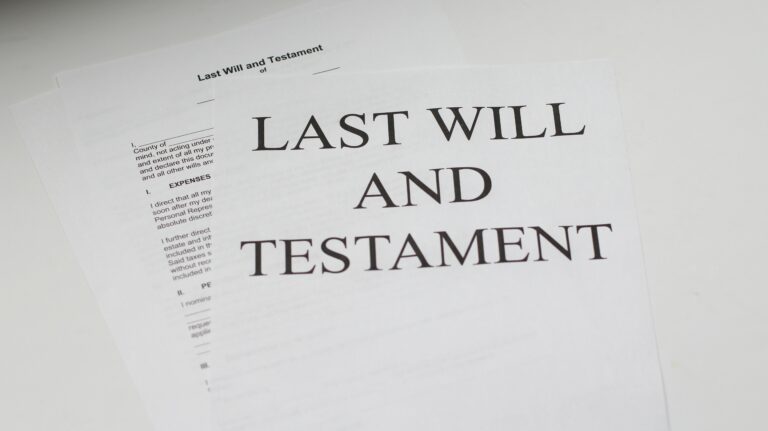
Top 5 Estate Planning Nightmares You Can Avoid with a Will
In the realm of estate planning, a common adage rings true: “Failing to plan is planning to fail.” As an experienced estate planning attorney, I’ve witnessed firsthand the turmoil and heartache that can ensue when individuals neglect the crucial step of drafting a will. This blog post is a clarion call to take control of your future and protect your loved ones from the all-too-common nightmares that arise from inadequate estate planning.
Family Disputes and Conflicts
The absence of a will can be the catalyst for family disputes that echo for generations. Imagine a scenario where siblings are torn apart, not by grief, but by the ambiguity of asset distribution. A will acts as a clear voice from beyond, guiding your family during a time of loss and preventing disputes that can irreparably fracture familial bonds.
Unintended Beneficiaries
Imagine your hard-earned assets falling into the hands of a distant relative you barely know, or worse, someone you wouldn’t have chosen to benefit from your estate. This isn’t just a hypothetical situation—it’s a reality for many who pass away without a will. Your will is a beacon, ensuring that your assets find their way into the right hands—those you specifically choose.
Delays and Additional Expenses
The probate process without a will is akin to navigating a ship through a storm without a compass. The journey is longer, fraught with legal complexities, and often more costly. By drafting a will, you provide a map that steers your estate through the probate process swiftly and efficiently, sparing your loved ones from unnecessary financial and emotional burdens.
Loss of Control Over Asset Distribution
Without a will, you relinquish control over who inherits your assets. State laws, devoid of personal sentiment, take the helm. This loss of control is especially critical if you have minor children or dependents whose future you wish to secure. A will is your tool to ensure that your specific wishes for your children’s guardianship and the distribution of your assets are honored.
Increased Legal Challenges
An estate without a will is fertile ground for legal disputes. These battles can drain your estate’s resources and leave your loved ones embroiled in legal quagmires. A well-crafted will is a shield, protecting your estate from the arrows of litigation and providing a solid legal foundation that upholds your wishes.
In conclusion, the nightmares of estate planning can be easily avoided by drafting a will. It is a fundamental step in ensuring your peace of mind and the well-being of your loved ones. Remember, a will is more than just a document; it’s a testament to your life, wishes, and legacy.
Don’t let indecision today lead to turmoil tomorrow. I invite you to take the first step in securing your legacy and safeguarding your family’s future. Contact me for a free consultation to discuss your estate planning needs. Together, we can craft a will that reflects your wishes, protects your assets, and provides clarity and comfort to your loved ones in times of need.
Remember, planning today creates peace of mind for tomorrow. Let’s embark on this journey together.
Key Takeaways
- Prevent Family Disputes: A will is essential to avoid familial conflicts over asset distribution, ensuring your wishes are clearly understood and respected.
- Control Over Beneficiaries: It enables you to designate precisely who receives your assets, preventing unintended beneficiaries from inheriting your estate.
- Efficient Probate Process: Drafting a will streamlines the probate process, reducing delays, complexities, and additional expenses for your loved ones.
- Guardianship of Dependents: A will allows you to make critical decisions about the future of your minor children or dependents, ensuring they are cared for as per your wishes.
- Legal Protection: Having a will minimizes the risk of legal challenges, protects your estate from potential disputes, and preserves its value for your beneficiaries.
Frequently Asked Questions
Why is a will important if I don’t have a large estate?
A will is crucial regardless of the size of your estate. It ensures that your assets are distributed according to your wishes, no matter how modest. It also helps appoint guardians for minor children and can minimize legal complexities for your loved ones.
Can I write my own will, or do I need an attorney?
While writing your own will is possible, consulting an experienced attorney is advisable to ensure that it meets legal requirements and accurately reflects your wishes. An attorney can help avoid common pitfalls that might render your will invalid or ineffective.
What happens if I die without a will?
If you die without a will, your estate will be distributed according to state intestacy laws, which may not align with your personal wishes. This can lead to unintended beneficiaries receiving your assets and complicate matters for your loved ones.
How often should I update my will?
Reviewing and possibly updating your will every 3-5 years or after major life events such as marriage, divorce, the birth of a child, or significant changes in your financial situation is recommended. This ensures your will remains relevant to your current circumstances.
Can a will reduce taxes on my estate?
A well-planned will can help in minimizing estate taxes. An estate planning attorney can guide you in structuring your will and other estate planning tools to maximize tax efficiency and preserve the value of your estate for your beneficiaries.



